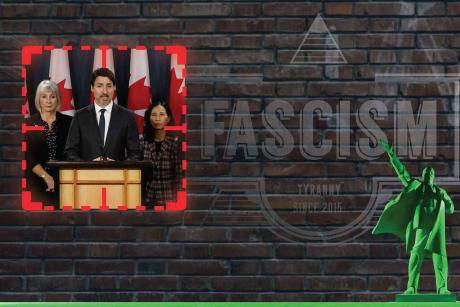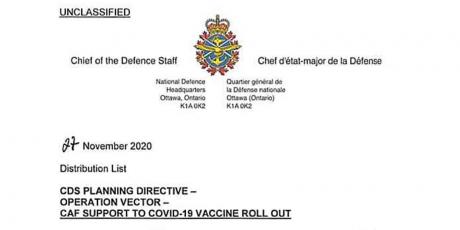The Canadian military is taking heat after news broke that a mock letter, penned by “information warfare specialists” in a reserve unit, made its way into the hands of civilians warning the public about a fictitious pack of grey wolves on the loose in the province of Nova Scotia. The incident also involved playing sounds of wolves howling in the woods through a loudspeaker.
In an interview with Motherboard, a Canadian Armed Forces member familiar with the situation (who wasn’t authorized to speak to the media) says the letter and the speakers were all part of a training simulation strictly for an official military exercise the 36 Canadian Brigade Group (CBG) put on for its soldiers.
- “Tactical psyops soldiers were practicing setting up and using a loudspeaker with a larger group of soldiers,” they said.
The letter, forged to seem like it came from a government ministry, was then given to a group of soldiers on the same exercise to make the simulated training seem more authentic, according to the source.
- “On the 3rd of August 2020, the Department of Lands and Forestry of Nova Scotia in conjunction with the Canadian Wildlife Service, Environment and Climate Change Canada untook [sic] the significant act to reintroduce the Gray Wolf to the forests of Nova Scotia,” the letter begins. “Unfortunately, the ‘pack’ has migrated to the Annapolis Valley floor in search of easy pray [sic] and livestock … if a Gray Wolf is encountered, do not provoke, engage, or feed the animal. Back away slowly while remaining calm—do not turn and run.”
The National Post, which broke the story, noted that the letter was a convincing fakery: it used a forged logo of the province’s wildlife division and then went so far as to cite the name of a real government employee as the author (using their contact information), something the military acknowledges as a big mistake.
The letter was concerning enough that Nova Scotia Department of Lands and Forestry declared it a fake on Twitter. "Alert: This letter has been showing up in some mailboxes. It’s fake. We do not know who circulated it or why," the department wrote. "There have been no Gray wolves released anywhere in Nova Scotia by any government agencies."
- “The creation of these letters and their contents–even if never meant for public consumption–was wrong," said Department of National Defence spokesman Dan Le Bouthillier.
Somehow that letter leaked to the wider community, and was augmented by the use of loudspeakers by the reservists.
- “They chose this sound [wolves howling] because a loudspeaker can get really loud. If locals hear a loudspeaker, they might complain. But in this part of Canada, the sound of wolves crying is part of normal, everyday life,” said the source. “The whole idea was to get the [reserve soldiers] to listen for the sound of wolves, set up the loudspeaker, play sounds that don’t upset locals,” then reveal to the reservists, “what a loudspeaker is, and what a psyops soldier is.”
In other words, this was a case of rank incompetence: the letter, which was not created with the consent of the Nova Scotia government, was only ever meant to be part of a training simulation to help convince the soldiers in the training to listen up for wolves during the exercise, while the psyop soldiers tested their capabilities using the speakers. (In Afghanistan, psyops warfare units were known to blast messages to the Taliban with similar loudspeakers, demanding they retreat in the face of overwhelming numbers.)
The source maintained that no part of the exercise was a broader clandestine effort to train Canadian soldiers on how to manipulate Canadian civilians domestically.
But in recent months the role of the military intelligence branch in the country, the largest branch of intelligence gathering in the Canadian government, has come under fire . In March, a government oversight committee, tasked as a watchdog of various spy agencies, highlighted how military intelligence needed more guidance with its operations involving the privacy of Canadian citizens.
The incident in Nova Scotia, even if committed by some wayward reservists who unintentionally caused panic in a community, underscores those types of privacy concerns.
- “Firstly, 36 CBG of the CAF have unreservedly apologised to the people of Nova Scotia for the recent release to the public of a mock letter warning about the reintroduction of grey wolves into rural Nova Scotia,” said Le Bouthillier. “That is why an investigation is ongoing to determine how this incident occurred, and how similar incidents must be avoided in future.”
How this faked letter, written by reservist soldiers who would not typically have the top secret clearances required for covert operations, made its way into the hands of the public remains a mystery and casts a serious shadow over the operational security of CAF training missions and the rules surrounding how exercise materials are allowed to be made.
At the same time, Canadian soldiers in Latvia that are deployed as part of a broader NATO mission in the Baltics to deter Russian aggression, have been the subject of repeated disinformation campaigns allegedly emanating from Kremlin strategists, which has prompted the CAF to train their soldiers more broadly on how to detect and deploy influence operations.
- “Influence activities are used by foreign entities,” said Le Bouthillier, “and it remains important that we train our CAF members on how best to respond to these malicious foreign actors in an increasingly complex information space, which was part of this training activity,”





Comments